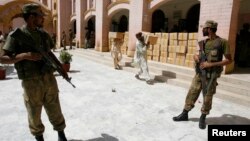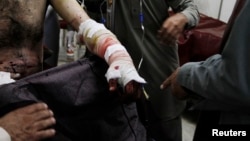ISLAMABAD —
Pakistan is set to witness its first democratic transition when national polls are held on Saturday. But militant and other violence continue to overshadow the election season, leaving more than 100 people dead and scores more wounded since late April.
Federal Capital, Islamabad - 2 seats
Punjab Province - 183 seats
Sindh Province - 75 seats
Khyber Pakhtunkhaw Province - 43 seats
Baluchistan Province - 17 seats
Regional and Ethnic Parties
Religious Political Parties
Contesting parties and candidates have to officially end the three-week campaign for the May 11 polls before midnight on Thursday. But the lead-up to the election has turned out to be one of the bloodiest in Pakistan’s history.
Pakistan Elections - What's at Stake?
What's at Stake?- Voters choose members of the National Assembly, or lower house parliament
- 342 seats, 60 are reserved for women, 10 are reserved for religious minorities
- Seats are distributed by region:
Federal Capital, Islamabad - 2 seats
Punjab Province - 183 seats
Sindh Province - 75 seats
Khyber Pakhtunkhaw Province - 43 seats
Baluchistan Province - 17 seats
- Voters also electing members of four provincial assemblies
Taliban militants have carried out almost daily bomb attacks on political offices, public rallies and other events connected to the elections. The nation-wide violence has left dozens of people dead including several candidates and has effectively prevented many key politicians from openly campaigning.
The former ruling Pakistan Peoples Party or PPP along with its coalition partners, namely the Awami National Party (ANP) and the Muttahida Qaumai Movement (MQM), have borne the brunt of the Taliban attacks.
The three secular parties are staunchly opposed to the Islamist militancy. They had backed the army’s actions to clear Pakistan’s volatile northwest of the Taliban.
Senator Farhatullah Babar of the former ruling party says Taliban attacks have severely hampered the three parties from campaigning and it could hurt them at the polls.
“This is the first election in Pakistan in which the progressive, liberal and democratic parties have been publicly threatened by the militants and extremists that they will not be allowed to participate in the electioneering. And the field is open for all other political parties but for these three political parties," he said.
This week’s back-to-back bombings of two rallies of a leading Islamic party, Jamiat Ulema-e-Islam (JUI-F), have strengthened views the Taliban are opposed to democracy and are targeting anyone taking part in the elections
This week’s back-to-back bombings of two rallies of a leading Islamic party, Jamiat Ulema-e-Islam (JUI-F), have strengthened views the Taliban are opposed to democracy and are targeting anyone taking part in the elections
Pakistan's Main Political Parties
Main Political Parties Fielding Candidates- Pakistan Peoples Party or PPP
- Pakistan Muslim League-Nawaz or PML-N
- Pakistan Muslim League (Quaid-i-Azam) or PML-Q
- Pakistan Tehreek-e-Insaf or PTI
Regional and Ethnic Parties
- Muttahida Quami Movement or MQM
- Awami National Party or ANP
- Baluchistan National Party (Mengal)
- National Party
Religious Political Parties
- Jamaat-i-Islami (JI)
- Jamiat Ulema Islam (Fazlur Rehman) or JUI-F.
The violence against the largely secular Pakistani parties is seen by many as benefiting their rivals from right-wing political and religious groups known for being sympathetic to the conservative Islamic forces. A spokesman for the religious-based party, Jan Achakzai, rejects claims that his party is benefiting from the violence, and he blames the violence on the what he says is the failure of the secular parties to fight corruption.
Tahira Abdullah, a human rights activist and accredited election observer, says that militancy alone is not what is making the current election campaign one of bloodiest. She says that past interventions through military coups and through pro-army political forces in the democratic process are also to be blamed for rising intolerance in the Pakistani society.
“It is absolutely a false characterization. Yes, we have this violence it is because of the past policies of the coalition government. They embezzled money from the U.S. under the name of anti-terrorism. They did not formulate an [effective] anti-terror strategy," he said.
Tahira Abdullah, a human rights activist and accredited election observer, says that militancy alone is not what is making the current election campaign one of bloodiest. She says that past interventions through military coups and through pro-army political forces in the democratic process are also to be blamed for rising intolerance in the Pakistani society.
“Every few years we see a derailing of the democratic process whether it is the election process or the legislative process or dismissing of governments or the judiciary is tolerant or not tolerant. So there are a number of factors, it is a multi dimensional issue as to why and how these elections 2013 have turned so violent and so blood thirsty," she said.
According to recent public opinion polls Nawaz Sharif’s party (Pakistan Muslim League, PML-N) is expected to win Saturday’s parliamentary elections. The two-time former prime minister has been apparently able to capitalize on failures of the outgoing coalition government to tackle the power crisis, economic challenges and the Taliban insurgency.
According to recent public opinion polls Nawaz Sharif’s party (Pakistan Muslim League, PML-N) is expected to win Saturday’s parliamentary elections. The two-time former prime minister has been apparently able to capitalize on failures of the outgoing coalition government to tackle the power crisis, economic challenges and the Taliban insurgency.
Cricketer-turned-politician Imran Khan’s party has also become a leading contender in the elections. Both Sharif and Khan have supported talks with Taliban insurgents to end the militancy in the country.
Meanwhile an extremely subdued election campaign is being witnessed in southwestern Baluchistan province but that is mainly due to attacks by Baluch separatists.
Only 44 percent Pakistani voters showed up in the election 2008. Authorities have employed tens of thousands of regular and paramilitary troops to ensure safety of the voters but observers are worried about a low turnout if violent attacks continue into Saturday.













